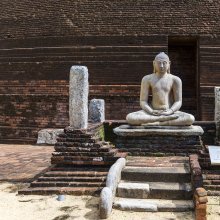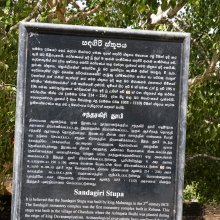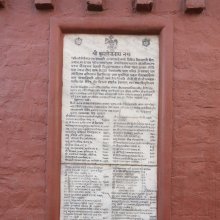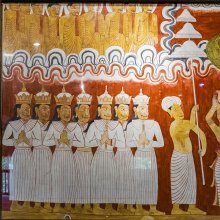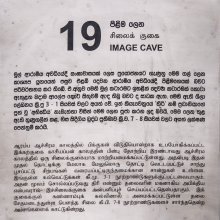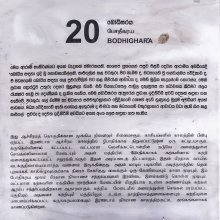Devana, Deva-na: 13 definitions
Introduction:
Devana means something in Hinduism, Sanskrit, Buddhism, Pali, Marathi, Jainism, Prakrit. If you want to know the exact meaning, history, etymology or English translation of this term then check out the descriptions on this page. Add your comment or reference to a book if you want to contribute to this summary article.
Images (photo gallery)
(+9 more images available)
In Hinduism
Purana and Itihasa (epic history)
Source: Cologne Digital Sanskrit Dictionaries: The Purana Index1a) Devana (देवन).—The son of Devakṣatra, a true Kṣatriya; father of Madhu.*
- * Brahmāṇḍa-purāṇa III. 70. 45; Vāyu-purāṇa 95. 44.
1b) A mountain in Krauñcadvīpa.*
- * Matsya-purāṇa 122. 80.

The Purana (पुराण, purāṇas) refers to Sanskrit literature preserving ancient India’s vast cultural history, including historical legends, religious ceremonies, various arts and sciences. The eighteen mahapuranas total over 400,000 shlokas (metrical couplets) and date to at least several centuries BCE.
Languages of India and abroad
Marathi-English dictionary
Source: DDSA: The Molesworth Marathi and English Dictionaryḍēvaṇa (डेवण).—f A declivity or slope.
--- OR ---
ḍēvaṇa (डेवण) [or णें, ṇēṃ].—n An appointed time or place: also the nick, critical moment, exact point.
Source: DDSA: The Aryabhusan school dictionary, Marathi-Englishḍēvaṇa (डेवण).—f A deelivity or slope.
--- OR ---
ḍēvaṇa (डेवण) [or ṇēṃ, or णें].—n An appointed time or place: also the nick, critical moment, exact point. A declivous place, a decli- vity or slope.
Marathi is an Indo-European language having over 70 million native speakers people in (predominantly) Maharashtra India. Marathi, like many other Indo-Aryan languages, evolved from early forms of Prakrit, which itself is a subset of Sanskrit, one of the most ancient languages of the world.
Sanskrit dictionary
Source: DDSA: The practical Sanskrit-English dictionaryDevana (देवन).—[dīvyatyanena div karaṇe lyuṭ] A die.
-nam 1 Beauty, splendour, lustre.
2) Gaming, gambling, a game at dice; प्रकाशमेतत्तास्कर्यं यद्देवनसमाह्वयौ (prakāśametattāskaryaṃ yaddevanasamāhvayau) Manusmṛti 9.222.
3) Play, sport, pastime.
4) A pleasure-ground, a garden.
5) A lotus.
6) Emulation, desire to excel.
7) Affair, business.
8) Praise.
9) Going, motion.
1) Grief, lamentation, sorrow.
-nā 1 Gambling, a game at dice.
2) Sport, pastime.
3) Lamentation.
Derivable forms: devanaḥ (देवनः).
--- OR ---
Devana (देवन).—the path leading to मोक्ष (mokṣa); सत्येन पन्था विततो देवयानः (satyena panthā vitato devayānaḥ) Muṇḍ.3.1.6.
Derivable forms: devanaḥ (देवनः).
Devana is a Sanskrit compound consisting of the terms deva and na (न).
Source: Cologne Digital Sanskrit Dictionaries: Shabda-Sagara Sanskrit-English DictionaryDevana (देवन).—n.
(-naṃ) 1. Sport, play, pastime, &c. 2. Emulation, desire to excel or overcome. 3. Affair, business, profession. 4. Gaming. 5. Splendour, lustre, beauty. 6. Light. 7. Praise. 8. Motion. 9. Grief, sorrow. 10. A garden, a play or pleasure ground. 11. A lotus. m.
(-naḥ) A die or dice. f.
(-nā) 1. Service. 2. Sport, wanton sport or pastime. E. div to play, &c. affix lyuṭ, or yuc, fem. aff ṭāp .
Source: Cologne Digital Sanskrit Dictionaries: Benfey Sanskrit-English DictionaryDevana (देवन).—i. e. div + ana, n. Game at dice, Mahābhārata 2, 2033.
Source: Cologne Digital Sanskrit Dictionaries: Cappeller Sanskrit-English DictionaryDevana (देवन).—[neuter] shining, beaming; playing, game at dice.
Source: Cologne Digital Sanskrit Dictionaries: Monier-Williams Sanskrit-English Dictionary1) Devana (देवन):—[from dev] 1. devana n. lamentation, wailing, grief, sorrow, [cf. Lexicographers, esp. such as amarasiṃha, halāyudha, hemacandra, etc.]
2) [from deva] 2. devana m. a die, dice for gambling, [cf. Lexicographers, esp. such as amarasiṃha, halāyudha, hemacandra, etc.]
3) Devanā (देवना):—[from devana > deva] f. sport, pastime, [cf. Lexicographers, esp. such as amarasiṃha, halāyudha, hemacandra, etc.]
4) [v.s. ...] service, [cf. Lexicographers, esp. such as amarasiṃha, halāyudha, hemacandra, etc.]
5) Devana (देवन):—[from deva] n. (dev) shining, splendour, [Manvarthamuktāvalī, kullūka bhaṭṭa’s Commentary on manu-smṛti viii, 92]
6) [v.s. ...] gaming, a game at dice, [Ṛg-veda x, 43, 5; Mahābhārata; Rāmāyaṇa] etc.
7) [v.s. ...] play, sport, pastime, [cf. Lexicographers, esp. such as amarasiṃha, halāyudha, hemacandra, etc.]
8) [v.s. ...] pleasure-ground, garden, [cf. Lexicographers, esp. such as amarasiṃha, halāyudha, hemacandra, etc.]
9) [v.s. ...] a lotus, [cf. Lexicographers, esp. such as amarasiṃha, halāyudha, hemacandra, etc.]
10) [v.s. ...] praise, [cf. Lexicographers, esp. such as amarasiṃha, halāyudha, hemacandra, etc.]
11) [v.s. ...] desire, emulation, [cf. Lexicographers, esp. such as amarasiṃha, halāyudha, hemacandra, etc.]
12) [v.s. ...] affair, business, profession, [cf. Lexicographers, esp. such as amarasiṃha, halāyudha, hemacandra, etc.]
13) [v.s. ...] going, motion, [cf. Lexicographers, esp. such as amarasiṃha, halāyudha, hemacandra, etc.]
Source: Cologne Digital Sanskrit Dictionaries: Yates Sanskrit-English DictionaryDevana (देवन):—(naṃ) 1. n. Sport; gaming; lustre; motion; grief; a praise; a garden; a lotus. m. Dice. f. Service, sport.
[Sanskrit to German]
Sanskrit, also spelled संस्कृतम् (saṃskṛtam), is an ancient language of India commonly seen as the grandmother of the Indo-European language family (even English!). Closely allied with Prakrit and Pali, Sanskrit is more exhaustive in both grammar and terms and has the most extensive collection of literature in the world, greatly surpassing its sister-languages Greek and Latin.
Prakrit-English dictionary
Source: DDSA: Paia-sadda-mahannavo; a comprehensive Prakrit Hindi dictionaryḌevaṇa (डेवण) in the Prakrit language is related to the Sanskrit word: Ḍepana.
Prakrit is an ancient language closely associated with both Pali and Sanskrit. Jain literature is often composed in this language or sub-dialects, such as the Agamas and their commentaries which are written in Ardhamagadhi and Maharashtri Prakrit. The earliest extant texts can be dated to as early as the 4th century BCE although core portions might be older.
Kannada-English dictionary
Source: Alar: Kannada-English corpusDēvana (ದೇವನ):—
1) [noun] the act or an instance of going; motion.
2) [noun] effort or desire to equal or excel another or others; emulation.
3) [noun] a commercial or professional activity; business.
4) [noun] a die or pawn used in the game of chance.
5) [noun] the game of chance played with dice.
Kannada is a Dravidian language (as opposed to the Indo-European language family) mainly spoken in the southwestern region of India.
See also (Relevant definitions)
Partial matches: Yu, Deva, Tivu, Teva, Na.
Starts with (+12): Devana huli, Devana kanchana, Devanabha, Devanadi, Devanador, Devanadottara, Devanaga, Devanagara, Devanagari, Devanaghevana, Devanahuli, Devanakshatra, Devanala, Devanam Priyah, Devanama, Devanampiyatissa, Devanampriya, Devananda, Devananda suri, Devanandasuri.
Query error!
Full-text (+22): Paridevana, Devanampriya, Adevana, Devanahuli, Adhidevana, Abhidevana, Priyadevana, Videvana, Sudevana, Tevanam, Divana, Akshadevana, Devana kanchana, Devana huli, Depana, Dishanadevana, Parivedita, Devanandin, Devanam Priyah, Samnishedhati.
Relevant text
Search found 58 books and stories containing Devana, Deva-na, Ḍēvaṇa, Ḍevaṇa, Devanā, Dēvana, Divu-yu; (plurals include: Devanas, nas, Ḍēvaṇas, Ḍevaṇas, Devanās, Dēvanas, yus). You can also click to the full overview containing English textual excerpts. Below are direct links for the most relevant articles:
Notices of Sanskrit Manuscripts (by Rajendralala Mitra)
Early Chola Temples (by S. R. Balasubrahmanyam)
Temples in Somur < [Chapter II - Temples of Parantaka I’s Time]
Brahmanda Purana (by G.V. Tagare)
Chapter 70 - Dynasties of Jyāmagha and Vṛṣṇi < [Section 3 - Upodghāta-pāda]
Amarakoshodghatana of Kshirasvamin (study) (by A. Yamuna Devi)
Pastimes and Games < [Chapter 3 - Social Aspects]
Rig Veda (translation and commentary) (by H. H. Wilson)
Rig Veda 2.33.15 < [Sukta 33]
The history of Andhra country (1000 AD - 1500 AD) (by Yashoda Devi)
Part 3 - Lokhabhupala and Bhima III (A.D. 1150-1178) < [Chapter II - The Haihayas]
Part 4 - Choda II (A.D. 1163—1180) < [Chapter I - The Velanandu Chodas of Tsandavole (A.D. 1020-1286)]
